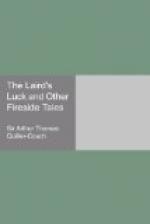He had asked his father’s permission. But for fifty years the small estate had been going from bad to worse. John’s grandfather in the piping days of agriculture had drunk the profits and mortgaged everything but the furniture. On his death, John’s father (who had enlisted in a line regiment) came home with a broken knee-pan and a motherless boy, and turned market-gardener in a desperate attempt to rally the family fortunes. With capital he might have succeeded. But market-gardening required labour; and he could neither afford to hire it nor to spare the services of a growing lad who cost nothing but his keep. So John’s request was not granted.
A week later, in the twilight of a May evening, John was digging potatoes on the slope above the harbour, when he heard—away up the first bend of the river—the crew of the Hannah Hands brigantine singing as they weighed anchor. He listened for a minute, stuck his visgy into the soil slipped on his coat, and trudged down to the ferry-slip.
Two years passed without word of him. Then on a blue and sunny day in October he emerged out of Atlantic fogs upon the Market Strand at Falmouth: a strapping fellow with a brown and somewhat heavy face, silver rings in his ears, and a suit of good sea-cloth on his back. He travelled by van to Truro, and thence by coach to St. Austell. It was Friday—market day; and in the market he found his father standing sentry, upright as his lame leg allowed, grasping a specimen apple-tree in either hand. John stepped up to him, took one of the apple-trees, and stood sentry beside him. Nothing was said—not a word until John found himself in the ramshackle market-cart, jogging homewards. His father held the reins.
“How’s things at home?” John asked.
“Much as ever. Hester looks after me.”
Hester was John’s cousin, the only child of old Penaluna’s only sister, and lately an orphan. John had never seen her.
“If I was you,” said he, “I’d have a try with borrowed capital. You could raise a few hundreds easy. You’ll never do anything as you’m going.”
“If I was you,” answered his father, “I’d keep my opinions till they was asked for.”
And so John did, for three years; in the course of which it is to be supposed he forgot them. When the old man died he inherited everything; including the debts, of course. “He knows what I would have him do by Hester,” said the will. It went on: “Also I will not be buried in consicrated ground, but at the foot of the dufflin apple-tree in the waste piece under King’s Walk, and the plainer the better. In the swet of thy face shalt thou eat bread, amen. P.S.—John knows the tree.”
But since by an oversight the will was not read until after the funeral, this wish could not be carried out. John resolved to attend to the other all the more scrupulously; and went straight from the lawyer to the kitchen, where Hester stood by the window scouring a copper pan.




